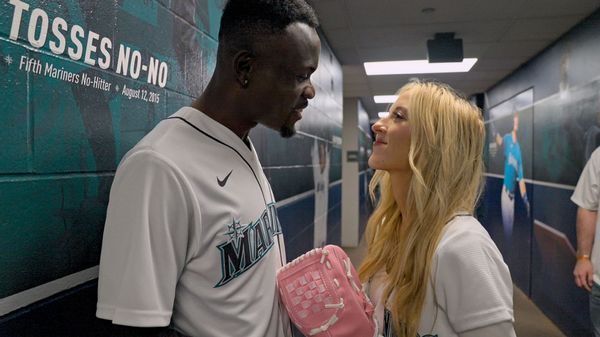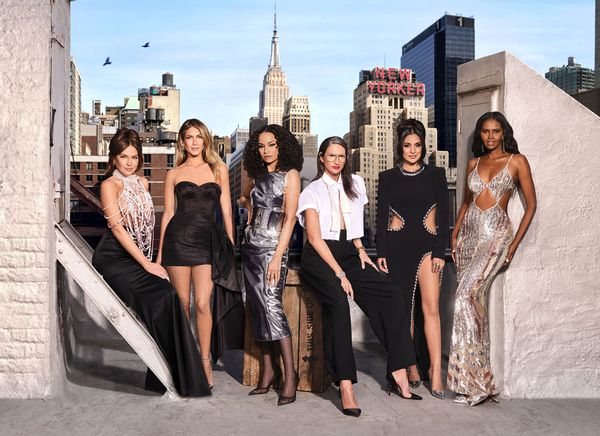
Two weeks after members of the Writers Guild of America who work in the film and TV industry went on strike, one of the most highly anticipated TV episodes of the year made its cable TV debut: "#Scandoval," the hastily filmed season finale of Bravo's "Vanderpump Rules."
The hour revealed the fallout of an affair between original cast member Tom Sandoval – who had been in a nine-year relationship with castmate Ariana Madix – and Raquel Leviss, who first appeared in the series' fifth season.
TMZ spilled the tea about the affair shortly after Madix discovered it, revealing the news to viewers four installments into a 10th season depicting Sandoval as still happily involved with Madix, and Leviss behaving like her loyal friend.
The news changed the nature of the season's viewing experience, turning the audience into witnesses to a tragedy they knew was unfolding while the players involved remained oblivious.
Online discussions comparing the action in each episode to the escalating frenzy surrounding the mess caused its viewership to swell until the long-awaited "#Scandoval" burst forth, attracting a series-high of 4.1 million viewers watching it Bravo, NBCU's streaming platform Peacock and video on demand within three days of its original airing, according to Variety.
This crowned the show's 10th season, which reached 11.4 million viewers to date.
If for some reason you don't know who these people are or why the resurgence of "Vanderpump Rules" 10 seasons along matters . . . well, first of all, congratulations. That means you've been spared regular sightings of Sandoval's unfortunate porn villain mustache and white nail polish.
But that also may leave you out of the loop concerning one of the more compelling developments of this so-called Hot Labor Summer. Before the WGA officially went on strike, and two months before SAG-AFTRA members joined them on the picket lines, a common warning held that if writers and actors walked out, networks would flood the airwaves with disposable reality dreck as they did in the 2007-2008 WGA strike. (Salon's unionized employees are represented by the WGA East.)
Looking at a few broadcast networks' plans for the fall, that's not entirely off-base. Broadcast and cable networks will be relying on a great deal of unscripted content to get by, along with true crime and reruns, as will cable and streaming.
But reality TV has transformed since that last writers' strike, which has since been falsely credited for initiating reality's surge. The longest-enduring reality shows on broadcast, including "Survivor," "The Bachelor" and "The Apprentice" were successful long before the strike began.
So it's unfair to tie that labor stoppage to the rise of Fulton County Jail Inmate P01135809.
One might instead link it to the unleashing of the Kardashians and their ilk.
Today's unscripted hits are clones of Andy Cohen's Bravo shows or "Keeping Up with the Kardashians," which made its E! debut weeks before the 2007 strike began. Cohen's first entry in his eternally popular "Real Housewives" franchise, "The Real Housewives of Orange County," premiered in 2006.
But its second installment, "The Real Housewives of New York City," debuted shortly after that strike ended, in March 2008. That title yielded the "Housewives" brand's main tastemaker Bethenny Frankel and "Crappie Lake" co-star Luann de Lesseps. Restaurateur Lisa Vanderpump became the breakout star of the "Beverly Hills" edition, leading to her spinoff following the lives of her young, striving staff.
The Kardashianizing side of unscripted is much narrower by design, with a single family generating multiple spinoffs and product lines, cornering an entire segment of the attention economy. When it began in 2007 Kim Kardashian was primarily identified as a Playboy model who starred in an amateur sex tape and the stepdaughter to a former Olympian. Today Kim Kardashian is a fashion mogul, prison reform advocate and crosser of picket lines.
These shows and their slew of imitators populate cable and streaming services with a bounty of glitzy, heightened antics that rival anything the late Aaron Spelling produced in his heyday, while changing the definition of what it means to be a celebrity – and how performers view the value of reality TV.

The "Vanderpump Rules" cheating crisis proves that these people's real lives produce plots as captivating as a scripted soap. Indeed, their ubiquity and popularity may be why so few primetime sudsers last beyond a season or two these days – it's tough to make up anything as raw and wrenching as the dirty ways real people do to each other.
All this may read as an argument that the studios shouldn't be pressed to forge a fair deal with the people who create the TV shows and movies that form the basis of our cultural dialogue. That could not be farther from the truth.
On the contrary: Season 10 "Vanderpump Rules" proves the point that Frankel and other reality personalities are making, which is that they deserve the type of contractual protections that unions like the WGA and SAG-AFTRA offer their members.
"I got paid $7,250 for my first season of reality TV, and people are still watching those episodes," she revealed on Instagram, going on to add, "I myself have generated millions and millions of dollars in advertising and online impressions being on reality TV, and have never made a single residual. So either I'm missing something or we're getting screwed too."
In the way of all things labor-related in the entertainment industry, Frankel, who starred in eight seasons of "The Real Housewives of New York" is not the prime example of someone being shortchanged by the reality TV machine. She parlayed her popularity on "RHONY" into a beverage brand, several spinoffs and a talk show, among other accomplishments. She realizes this, by the way, telling Variety's Marc Malkin, "I'm fine. I'm doing just fine," she said. "This is about the future and getting to control your own content and not accepting these deals anymore."
But she is someone with influence and enough power to attract some momentum.
Frankel's call for reality talent to unionize is gaining attention right now, but below-the-line unscripted TV staffers have been making noise for years about the punishing work schedules and environments. Some productions' staff have secured protections by unionizing under IATSE. In March the writer-producers at BSTV, the studio behind such Food Network shows "The Kitchen" and "Trisha's Southern Kitchen," voted to unionize with the WGA East.
Unionizing reality talent, on the other hand, is a concept many struggle to take seriously although recent news stories about the behind-the-scenes conditions on shows such as "Love Is Blind" lend urgency to the call for basic labor protections.
In April, Insider.com published a multiple-sourced report recounting the unacceptable conditions to which "Love Is Blind" cast members are subjected in exchange for being recorded 24 hours a day and seven days a week for up to eight weeks.

That stipend breaks down to $7.14 an hour, Insider said.
Beyond the compensation issues is the matter of the psychological and physical toll the experience took on several contestants who spoke with Insider. They describe 20-hour filming days and the toll of being entirely cut off from the outside world for the 10 days they dated in the pods.
Representatives for the show's production company Kinetic Content "dictated when they could sleep and where and when they ate," the article states. Hartwell's lawsuit cites the production's "unsafe and inhumane" working conditions, including depriving them of sleep, failing to provide enough food and water and overserving alcohol. Kinetic told Variety that Hartwell's claims are without merit.
Veteran entertainment attorneys Bryan Freedman and Mark Geragos, said to be working with Frankel, are already on the move, sending a series of letters to NBCU's general counsel, starting with one accusing the company of "a pattern and practice of grotesque and depraved mistreatment of the reality stars and crewmembers on whose account its coffers swell."
A letter sent Aug. 20, the contents of which were reported by The Wrap, accuses NBCU of turning a blind eye as its reality production partners enforce illegal nondisclosure agreements.
It alleges that the NDAs have "caused hundreds or thousands of people to stay silent about unlawful workplace conduct they have witnessed or experienced, which has included: racism; sexism; sexual violence; revenge porn; child labor; forced intoxication; and psychological, emotional, and physical abuse."
NBCU responded to these claims in various reports with some version of what they told The Hollywood Reporter, which embedded Freedman and Geragos's full letter in its report.
"NBCUniversal is committed to maintaining a safe and respectful workplace for cast and crew on our reality shows," the company said in a statement to THR.
This sentiment is similar to what Kinetic Content told The LA Times in April in response to its follow-up to Insider's "Love Is Blind" follow-up. "The well-being of our participants is of paramount importance to Kinetic. We have rigorous protocols in place to care for each person before, during, and after filming."
Last week Leviss, who has returned to using her birth name Rachel, broke her silence on Frankel's podcast after spending time in a mental health facility following the legendarily combative three-part "Vanderpump Rules" reunion. Her castmates and TMZ have refuted some claims she made to Frankel, including that her time on the show didn't amount to "a single penny" in compensation. TMZ countered with a report that she made $361,000 a season, as Vanderpump asserts in an ambush interview.

She emerged from that run of episodes looking like a hero and parlayed it into an empire. Leviss probably can't rely on the same luck – or that whatever extension of 15 minutes will set her up for the long run, to say nothing of protecting her public reputation. The "Vanderpump Rules" audience might say that lasting ignominy is what she deserves. Whether she also merits residuals for contributing to the show's highest-rated season with the heartache she caused is a separate conversation. No matter; at the moment she won't be getting them.







